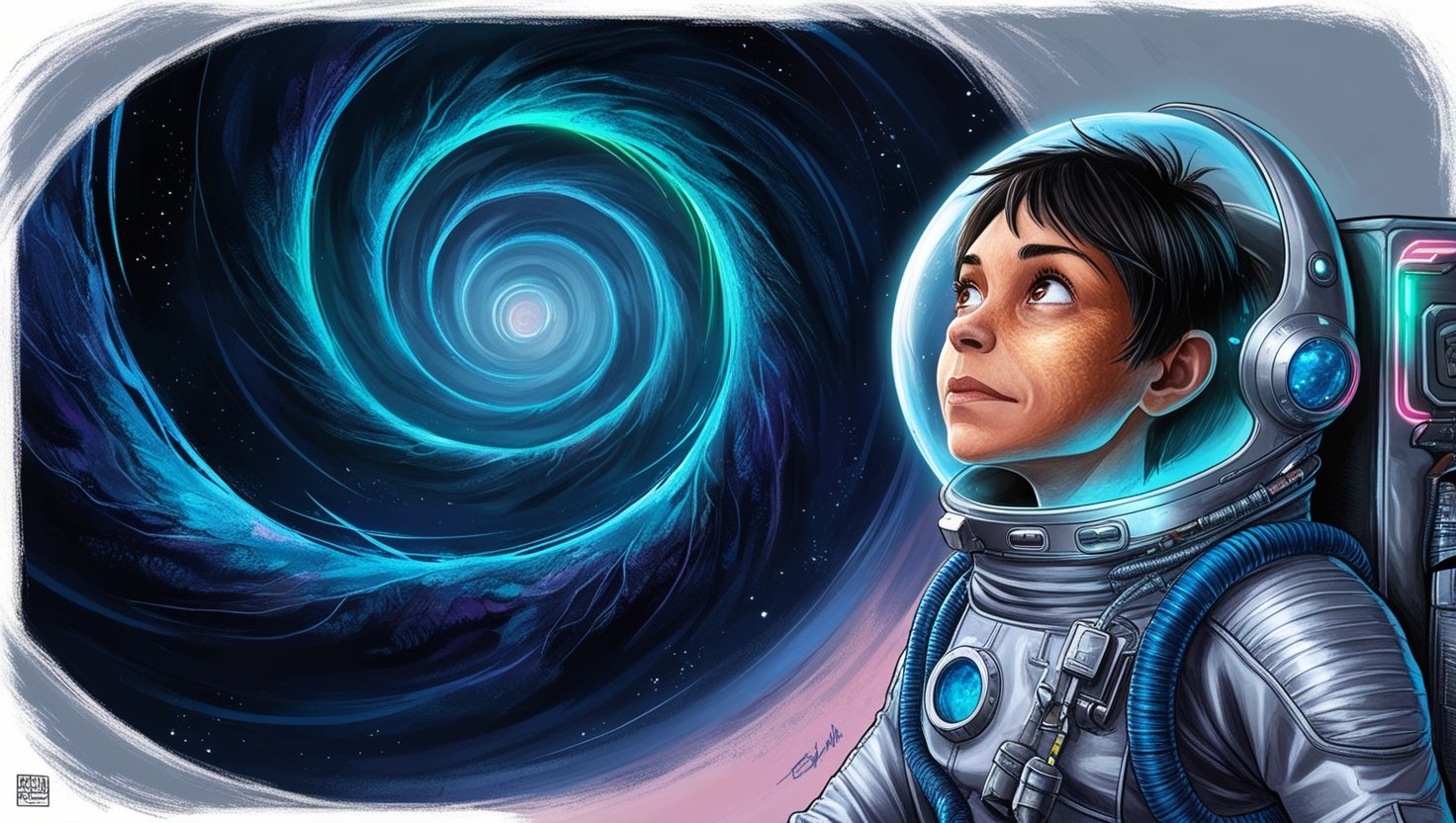How’s it going, gorgeous individuals?
Do you know that feeling when you look at the stars for an extended period and try to imagine the universe? It is massive, enigmatic, and full of interrogation, and the researchers can barely wait to answer. One of the great enigmas of the universe is dark energy.
This energy, which cannot be seen in any way, reaches almost 68% of the universe yet remains a mystery to us. The mysteries of dark energy include the potentially fascinating idea of whether dark energy can travel faster than light rate.
In this article, I will elaborate on the concepts of dark energy and its role in the universe and whether it can ever surpass the speed of light.
Let’s start !
What is Dark Energy
Dark energy is the phrase that describes the force accelerating the expansion of the universe. The idea first arose between 1997 and 1998 when two independent teams of astronomers studied distant supernovae—massive stars that explode and become supernovae—and found their brightness to be less than expected. The finding indicated not only that the universe was expanding but that it was doing so at an ever-increasing rate.
How Does It Work
In order to analyze dark energy, one first needs to examine the approach that the universe exhibits. It all began a little over 13.8 billion years ago with the Big Bang, wherein everything inside the universe began to be set in motion.
In the course of time, gravity acted over great distances, clumping matter together, forming stars, galaxies, and so forth. However, data collected in the last few years provides evidence that the expansion of the universe is not only going on but is also speeding up, which means some force acts against gravity. This is the point when dark energy comes in.
The Velocity of Light

The speed of light in space is almost equal to 299.792 kilometers per second (186,282 miles per second). In Einstein’s formulation of relativity, it is postulated that there is no speed more significant than that of light. This particular assumption has been one of the vital elements of contemporary physics and has been proven by numerous experimental verifications.
What is the Significance of the Speed of Light
The speed of light is a lot more than a unit of measure that shows how fast light travels. Here is how it helps understand space and time. When velocities approach the speed of light, objects get more mass, and their kinetic energy input agitation has to grow further in order to accelerate that object. For this reason, as per the existing knowledge of physicists, nobody with mass can travel with or more than the speed of light.
The Effects of Dark Energy on the Expansion of the Universe
Present dark energy is a major factor in the expansion of the universe. It is more of a repulsive force that serves to separate galaxies, thus increasing the size of the universe. Scientists theorize that dark energy emerged about 5 billion years after the Big Bang and has been the most dominant factor for the last 5 billion years.
The Rate of Expansion
In cosmology, the Hubble constant measures the expansion rate of the universe, which is the speed of the galaxies receding from us. Some recent measurements indicate that this is not true and that the expansion is, in fact, speeding up, which raises the question of dark energy and its meaning in this context.
Can Dark Energy outsmart the Speed of Light
Among the unexplained enigmas of dark energy, the most intense is whether it can move faster than light. Whatever dark energy may be, its contemporary interpretation and cosmology, in general, define it as a space rather than an object that travels somewhere like light or matter.
More On the Idea of Space Expanding
Before delving into the expansion of the universe, it is imperative to understand that it is space that is expanding and not objects within the space that are moving. With the increase in the universe’s size, the distance between the various galaxies increases. This is a form of expansion that could, however, occur at such a rate that would make apparent distant galaxies recede from us faster than light can travel. This does not break any known physical laws since it is not that the galaxies are moving away from one another within space; instead, it is space that is expanding in between them.
The Aftermaths of Superluminal Expansion

So, in order to understand the consequences of dark energy or superluminal expansion, it is reasonable to consider the idea of cosmic inflation. This theory has it that the universe went through an episode of extremely fast expansion, which occurred immediately after the Big Bang, increasing greatly in dimensions within an incomprehensibly small length of time. It appears that at this quarter of the time, sections of a particular space may have moved faster than what we term the absolute light speed as understood regarding the current state of the universe.
The Problem of the Horizon
In addition, the horizon problem constitutes one of the aspects of cosmology that has been difficult to tackle due to the cosmic microwave background radiation being found everywhere within the universe as it is very isotropic. The uniformity implies that parts of the universe that are now very far from each other were, at some point in the past, close enough to each other to be in physical contact. This is not a problem that was resolved by inflationary cosmology, for there were no regions in the early universe that connected those parts of the universe that were separated, thanks to superluminal expansion at its very early times.
Theories and Experiments
There are many theories regarding dark energy and the rate of the universe’s expansion. The most popular theory is the cosmological constant, which Albert Einstein first introduced in his field equations of gravity. This constant signifies the existence of a uniform energy density across space.
Another set of theories attempts to modify general relativity: for example, quintessence theory holds that dark energy is not constant but evolves, while phantom energy states that dark energy density can increase with time, resulting in a scenario called “Big Rip.”
Ongoing Research
Dark energy remains a subject of interest for scientists, who have developed a number of techniques, such as:
Supernova observations This technique allows astronomers to plot the expansion rate of the universe at different epochs by studying supernovae in the remote past.
Galaxy surveys An extensive survey of galaxies enables the subject to gauge their activity and positionality, hence extrapolating the effect dark energy has.
CMB CMB research can provide information about dark energy and earlier stages of the universe.
Conclusion
Dark energy is one of the most persistent enigmas of the universe, being the force responsible for its accelerated expansion, and defies many laws of fundamental physics principles. Even if it is complicated to state if dark energy is capable of moving faster than light, the source underlines the curious nature of space, time, and forces at work within the universe.
While they are a relatively new concept for research in cosmology, the focus on adjustment mechanics, in many ways, provides a better understanding of dark energy. It brings us closer to finding its value and importance in space, changing the environmental conditions of the universe. What other cosmic enigmas can we hope to solve in the process of investigating dark energy and its implications?
FAQ
- What is the interrelation of dark energy and vacuum energy?
Vacuum energy, which is the energy content of space when considered devoid of any matter, is one such energy that dark energy is associated with. Nonetheless, as suggested by some models, vacuum energy might actually act as a constituent of dark energy, which is responsible for the super luminious expansion of the universe.
- What is dark energy?
Dark energy is an enigmatic element responsible for the observed acceleration in the expansion of the universe. It constitutes nearly 68% of the universe’s mass-energy content, yet remains to be discovered in its understanding.
- Can dark energy move faster than light?
Although dark energy does not move at a speed exceeding the efficacy of light, its influence can cause the space between things to increase at a velocity greater than light’s speed.
- How does dark energy affect the universe?
The presence of dark energy enables the existence of a universe that expands at an ever-increasing rate, thereby affecting the motion of galaxies and the structure of the entire universe.
- What evidence do we have for dark energy?
Evidence for dark energy comes from studies of supernovae at enormous distances, the radiation background of the universe, and the very large-scale structure of the universe itself.





